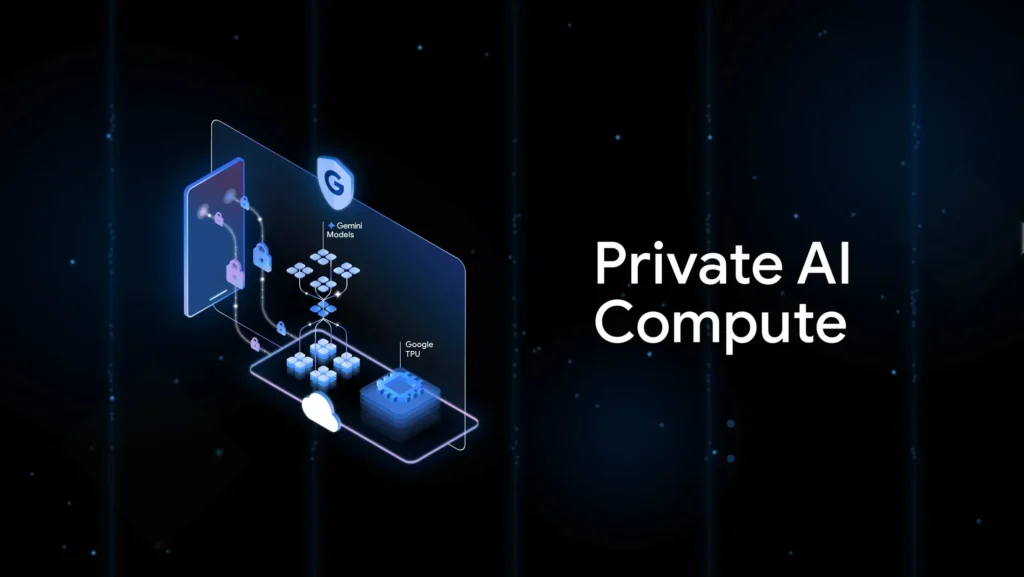Google launches Private AI Compute to ensure the confidentiality of Gemini Cloud
Google has recently announced the launch of Private AI Compute, a new cloud infrastructure designed to harness the power of Gemini models while ensuring the confidentiality of personal data.
The goal is to merge cloud performance with the security of on-device processing, a balance that has long been considered unattainable.
The Balance Between Power and Privacy
Until now, Google has promoted on-device processing — that is, processing directly on the phone — as the best way to protect privacy. For instance, Pixel devices already utilize Gemini Nano models to handle certain AI tasks without ever sending data over the Internet.
However, these local models have limitations: complex reasoning, planning, or multimodal generation calculations require significantly more processing power than what the chips in smartphones can provide.
This is where Private AI Compute comes in. This new platform allows for delegating certain AI tasks to the cloud while ensuring that processed data remains inaccessible to anyone — including Google. “We’re aiming to provide the best of both worlds: the power of the cloud and the privacy of local processing,” summarizes Google.
How Does Private AI Compute Work?
The system is based on an integrated architecture called Google Stack, which combines:
- Google’s TPU (Tensor Processing Units), specially designed for AI computation,
- A hardware security layer called Titanium Intelligence Enclaves (TIE),
- And a hardware-sealed environment based on AMD’s Trusted Execution Environment (TEE) technology, which isolates and encrypts memory during processing.
Specifically, your device establishes a secure connection to this “secure cloud“. The Gemini models perform the most intensive AI tasks (contextual analysis, text generation, summaries, proactive suggestions, etc.) without Google or any external entity being able to access the utilized data.
A remote attestation continuously certifies that the servers in use are indeed part of the secure system, preventing any interception.
According to an independent assessment conducted by NCC Group, this system adheres to the strictest privacy standards, equivalent to those of local processing.
Real-World Applications on Pixel Devices
The rollout of Private AI Compute begins with two flagship features on the Pixel 10:
- Magic Cue: This contextual suggestion system will become smarter and more responsive, capable of anticipating your needs based on your emails, calendar events, or messages — always securely.
- Voice Recorder: The audio transcription app will now be able to automatically summarize your recordings in more languages, thanks to the power of Gemini models run through Private AI Compute.
These functions mark the first use cases, but Google has already stated that other tools will follow, particularly in search, messaging, and personal planning.
A Hybrid Approach: Local + Secure Cloud
Google advocates for a hybrid strategy:
- Quick and simple tasks will continue to be managed locally, thanks to the embedded NPU (neural processing units).
- Complex tasks will be delegated to Private AI Compute, benefiting from the full power of Gemini Cloud models while maintaining the same privacy guarantees.
This approach allows for overcoming the hardware limitations of smartphones while respecting user privacy.
A Direct Response to Apple
It is difficult not to see in this announcement a response to Private Cloud Compute, the system that Apple presented earlier this year as part of Apple Intelligence. Both companies are adopting a similar philosophy: moving AI tasks to an isolated, physically secure, and impervious cloud — even for the host itself.
The main difference? Google relies on its own TPUs and a unified software infrastructure, already proven by services like Gmail and Search, to provide significantly higher computational power.
Toward a New Era of Private AI
By introducing Private AI Compute, Google aims to lay the groundwork for a truly personal artificial intelligence: an AI capable of analyzing your context, anticipating your needs, and assisting you seamlessly, without ever exposing your data.
“This is the beginning of a new generation of useful AI experiences, combining cloud power with personal privacy,” concludes Google in its announcement.
With Private AI Compute, Google is redefining the boundary between cloud and personal devices. This hybrid approach marks a significant step toward more powerful, proactive, and privacy-respecting AI — an area where tech giants are sure to engage in their next major battle.




